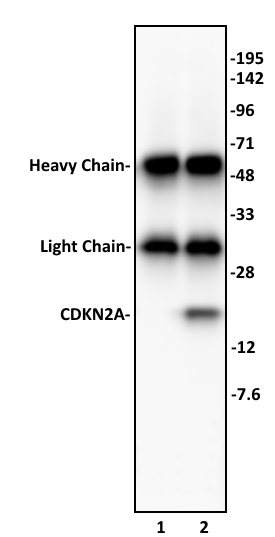CDKN2A antibody (pAb)
Host / Isotype
Rabbit / IgG
Reactivity
Human
Applications
IP, WB
Cat No : 61619,61620 61619
Synonyms
验证数据展示
产品信息
| Tested Applications |
IP, WB
Applications Validated by Active Motif: IP: 10 ul per IP WB: 1:500 - 1:2,000 dilution |
| Tested Reactivity | Human |
| Host / Isotype | Rabbit / IgG |
| Class | Polyclonal |
| Type | Antibody |
| Immunogen | This antibody was raised against a peptide within the N-terminal region of the p16/INK4a isoform of human CDKN2A. |
| Full Name | CDKN2A antibody (pAb) |
| Synonyms | CDKN2A, Cyclin-Dependent Kinase Inhibitor 2A, P16-INK4A, CDKN2, P16INK4, MTS1, P16INK4A, Cyclin-Dependent Kinase Inhibitor 2A (Melanoma, P16, Inhibits CDK4), Multiple Tumor Suppressor 1, TP16, CDK4I, CDK4 Inhibitor P16-INK4, MTS-1, CMM2, P16, p16-INK4, ARF, p16-INK4a, INK4, p16INK4A, INK4A, tumor suppressor, dysplastic nevus syndrome, cdkn2a-related cutaneous malignant melanoma, transcript, antibody, antibodies, polyclonal, pab, western blotting, wb, immunoprecipitation, ip, samples |
| Molecular weight | 16 kDa |
| GenBank accession number | NP_000068 | RRID | AB_2793705 | Purification Method | Affinity Purified |
| Buffer | Purified IgG in PBS with 30% glycerol and 0.035% sodium azide. Sodium azide is highly toxic. |
| Storage | Some products may be shipped at room temperature. This will not affect their stability or performance. Avoid repeated freeze/thaw cycles by aliquoting items into single-use fractions for storage at -20°C for up to 2 years. Keep all reagents on ice when not in storage. |
背景介绍
CDKN2A (Cyclin-Dependent Kinase Inhibitor 2A) is capable of inducing cell cycle arrest in G1 and G2 phases. Acts as a tumor suppressor. Binds to MDM2 and blocks its nucleocytoplasmic shuttling by sequestering it in the nucleolus. This inhibits the oncogenic action of MDM2 by blocking MDM2-induced degradation of p53 and enhancing p53-dependent transactivation and apoptosis. Also induces G2 arrest and apoptosis in a p53-independent manner by preventing the activation of cyclin B1/CDC2 complexes. Binds to BCL6 and down-regulates BCL6-induced transcriptional repression. Binds to E2F1 and MYC and blocks their transcriptional activator activity but has no effect on MYC transcriptional repression. Binds to TOP1/TOPOI and stimulates its activity. This complex binds to rRNA gene promoters and may play a role in rRNA transcription and/or maturation. Interacts with NPM1/B23 and promotes its polyubiquitination and degradation, thus inhibiting rRNA processing. Interacts with COMMD1 and promotes its 'Lys63'-linked polyubiquitination. Interacts with UBE2I/UBC9 and enhances sumoylation of a number of its binding partners including MDM2 and E2F1. Binds to HUWE1 and represses its ubiquitin ligase activity. May play a role in controlling cell proliferation and apoptosis during mammary gland development. Isoform 6 may be involved in regulation of autophagy and caspase-independent cell death; the short-lived mitochondrial isoform is stabilized by C1QBP. Multiple protein isoforms are encoded by this gene. The p16 isoform, also known as INK4a, is a CDK4 & CDK6 kinase inhibitor. It functions as negative regulator of the proliferation of normal cells and plays a role in aging and senescence.


